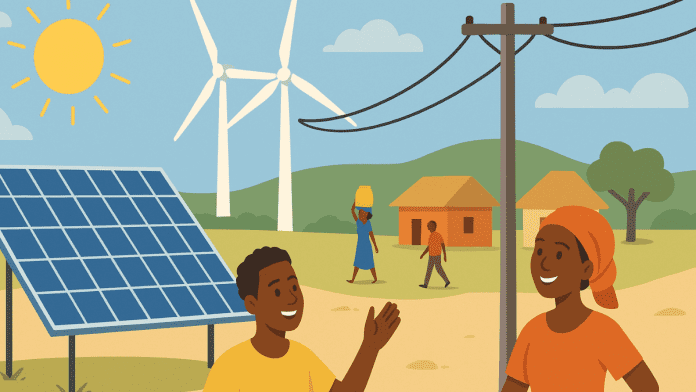🕒 Last updated on September 30, 2025
The European Union (EU) has announced a landmark $638 million (€545 million) initiative to support Africa’s clean energy transition.
EU Pledges $638 Million to Power Africa
The funding aims to bring electricity to more communities, modernize outdated power grids, expand access to renewable energy, and accelerate the continent’s shift to greener sources like solar, wind, and hydropower.
Despite rapid growth in some regions, millions of people in Africa still live without access to electricity. According to estimates, about 600 million Africans currently lack power. The EU’s investment is designed to target this gap, especially in rural and underserved areas. By making electricity more available and affordable, the initiative also aims to improve livelihoods, boost education and healthcare access, and drive economic growth across the continent.
This funding will support projects in nine countries: Cameroon, the Central African Republic, the Republic of Congo, Côte d’Ivoire, Ghana, Lesotho, Madagascar, Mozambique, and Somalia. The program focuses on enhancing regional energy infrastructure while increasing electricity access in remote communities.
How the Funding Will Be Used
The EU’s support is carefully tailored to meet each country’s energy needs. In Côte d’Ivoire, €359.4 million will finance a high-voltage power project designed to strengthen regional electricity distribution. This project will improve access for both households and businesses, supporting economic growth and stability.
Cameroon will receive €59.1 million for rural electrification. Many rural communities in Cameroon currently rely on costly or unreliable energy sources. The new funding will help extend electricity networks to remote areas, improving daily life and creating new economic opportunities.
In Somalia, €45.5 million will increase access to affordable renewable energy, giving communities more reliable power for homes, schools, and businesses. Meanwhile, the Republic of Congo will receive €3.5 million to expand renewable sources, including solar, wind, and hydropower, creating a cleaner energy mix for the country.
Lesotho’s Renewable Lesotho program will benefit from €25.9 million to unlock wind and hydro energy potential. Ghana will receive €2 million to lay the groundwork for a large-scale solar park and encourage regional energy trade. Madagascar will see €33.2 million to expand mini-grid electrification in rural areas, providing reliable energy to communities that currently have limited access. Mozambique will receive €13 million to support a low-emission energy transition and attract private sector involvement.
These investments are designed not only to provide electricity but also to stimulate job creation. Experts expect renewable energy projects across Africa could create up to 38 million green jobs by 2030, giving a significant boost to local economies while addressing climate challenges.
Supporting Africa’s Clean Energy Transition
The European Commission launched this package as part of its broader Global Gateway investment plan. The plan is aimed at supporting sustainable development and global climate goals while helping African countries accelerate their clean energy journey.
Leaders highlighted that the energy choices Africa makes today will shape the continent’s future and the world’s environmental path. Renewable energy investments not only reduce reliance on fossil fuels but also create new employment opportunities, strengthen infrastructure, and enhance social stability.
UN restores sanctions list on Iran with 43 people and 78 groups named
By targeting both rural electrification and regional power infrastructure, the EU’s support seeks to reach communities that have long struggled without reliable electricity. Access to energy is critical for modern life—schools, hospitals, businesses, and homes all depend on it. By improving electricity access, these projects are expected to have a lasting impact on health, education, and economic activities across Africa.
European officials emphasized that clean energy is a shared priority for Africa and the EU. The $638 million package is a strong signal of commitment, offering practical support for countries ready to expand their renewable energy capacity.
With projects spread across multiple countries, from solar parks in Ghana to wind and hydro energy in Lesotho, the initiative represents a multi-faceted approach to Africa’s energy challenges. The EU’s backing could transform how millions of people live, work, and study, while contributing to global climate efforts.

